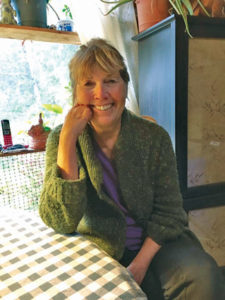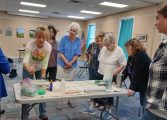Improvisation, or improv, is a tool that actors are taught to help them through scenes and work on characterization. Beth Sherk, a retired drama teacher at Fork Union Military Academy, is reviving her love of improvisation and returning to her roots to do some workshops in July, for those who are interested and would like to learn more about improv.
“Not only is it social, fun, exciting and challenging, but in the right environment, it’s a great bonding experience,” Sherk said. As the president and current director of Persimmon Tree Players, she said she would like to see this as an off-season addition to their full scale plays. “Not everyone can be cast in a play, but this can fill that gap and give folks the opportunity to stretch their acting wings in a supportive environment.” It also does not require the long commitment a pla y often entails.
y often entails.
“Sometimes people have the opinion that improv is hard and scary, or that you have to be a super clever person to do it,” said Sherk. “For over 25 years, I’ve encountered these sentiments from my drama students and my response is always: ‘Really? Because you’ve been improvising your whole life! What is life but a big improvisation?’”
She sets the scene in a doctor’s office and everyone slips into their roles as patients. But what if someone fell out of their chair, had trouble breathing and was clutching their chest? “Naturally, you would react,” she said. “It’s common sense; that’s improv.”
Sherk pointed out that improvisation is really just playing pretend but with guidelines. Since most people grew up playing pretend, it’s the most natural thing in the world.
“The biggest difference is that with improv, no matter what the conflict is, we’re always secretly cooperating to make the illusion look real,” said Sherk. “So to avoid those ‘you’re already dead – no I’m not’ moments we use the Law of Agreement. Instead of denying the piece of information your partner brings into the scene, you accept and build on it.”
Improvisation is not like chess, which is planned in eight moves in advance, but more like a ping pong match, she said. You never know where the ball is going or how the match will end.
Listening is key to improvisation. When someone blurts out something unexpected, Sherk encourages embracing it, going with the flow and adapting so it makes sense.
But how does improv serve the actor as a meaningful exercise?
“Imagination,” said Sherk. “This could simply mean learning to trust the first thing that pops into your head – which is so often the very thing that moves the scene forward. The imagination abhors an empty space – and it’s going to fill it with something.” Actors will create images in response to something the other has said. It is these images that create a stream of dialogue even if the actions seem disconnected.
“It is so often the unexpected choice that moves the scene in the most awesome directions,” she said. “We use a lot of random choice in improv – for example, randomly picking a place and a character or first line of dialogue. This prevents the planning mind from hijacking the process prematurely. The planning mind is famous for coming up with predictable stereotypes. Working with random elements opens up space for the imagination to enter with the unexpected detail or plot twist.”
When you get two or more people imagining together it is called the group mind, and it’s greater than the sum of its parts.
“You begin a scene with just the bare bones, a couple of characters, a place, a situation or the first line and then you basically fake it ‘til you make it,” she said. “Details emerge, a story starts to take shape and then all you do is follow it to its logical conclusion.” She added that a scene may not be working: either the setup is flawed or the players have painted themselves into a corner and can’t figure out how to move it forward. Sometimes it is like charades and the players just don’t get it, but with more clues the light comes on.
“Respecting other players’ choices is a big part of the Law of Agreement,” she said. Driving the scene by undercutting or setting someone up for an awkward moment does not allow others the chance to discover and flesh out their characters. “You learn to help them through lost in space moments.”
She stressed that improv is a lot like role playing in psychology. It leads to self-discovery and relationships.
“The main ingredients for improvisation are what makes any relationship work: cooperation, respect, listening, commitment, sincerity,” she said. Sincerity is the foundation for playing any character. “Being true to the character means seeing the world through your character’s eyes. For example, Homer Simpson is funny not because he tries to be; he is funny because he is sincerely stupid.”
For more information, contact Beth Sherk at beth.sherk71@gmail.com.




